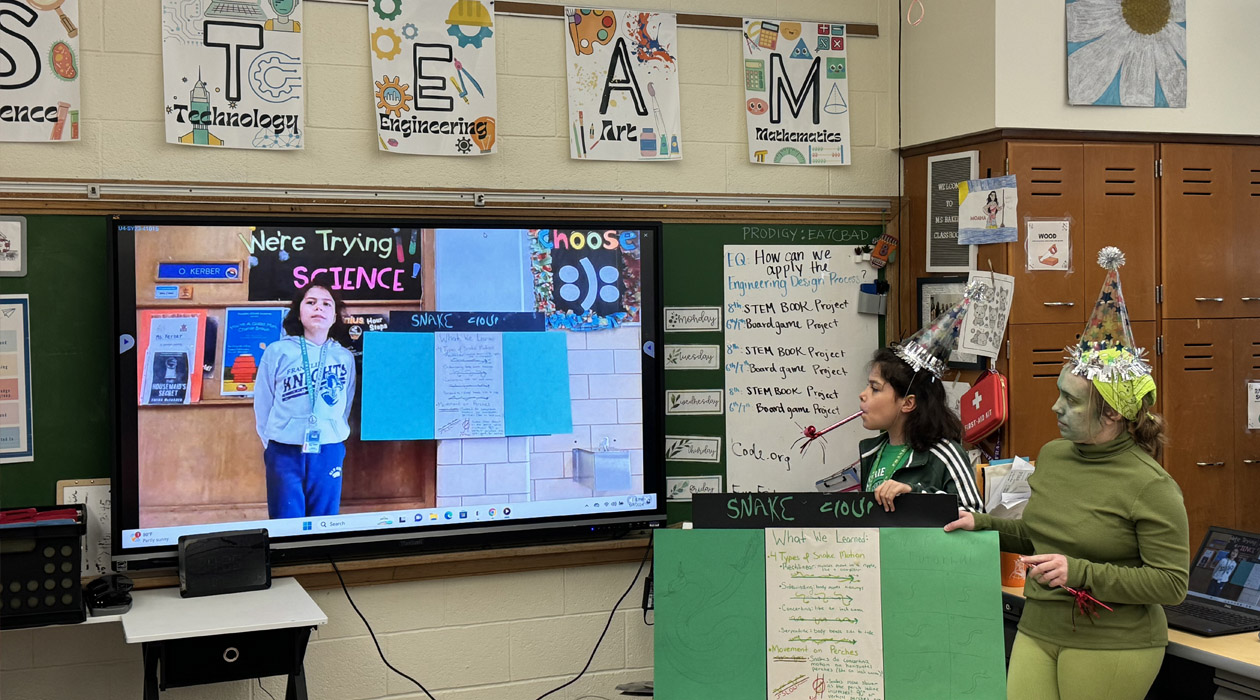Full STEAM ahead for science! Another year of STEAM TRAIN comes to completion

STEAM TRAIN engages middle school students to pursue whatever research projects interest them, with topics ranging from computer programming, flatworm regeneration, and snake locomotion. / Sarah Choi
What do marine ecosystems, worm regeneration, and a soccer-themed video game have in common? On the surface, perhaps nothing, but these are some of the fascinating projects middle schoolers pursued as part of the STEAM TRAIN program this year. The STEAM (Science, Technology, Engineering, Arts, and Mathematics) TRAIN (Transdisciplinary Research Across Institutional Near-peers) program is a collaboration between the Carl R. Woese Institute for Genomic Biology, Franklin STEAM Academy, and Uni High, that encourages middle school students to explore any science or engineering projects that interest them, with no limits other than their own creativity (and feasibility, of course).
STEAM TRAIN is organized by IGB’s Senior Outreach Activities Coordinator Daniel Urban and Franklin’s Magnet Site Coordinator Zanne Newman, and funded by the University of Illinois’ Community Research Partnership Program. The program runs from September to May every year, and has just completed its fourth successful year, engaging over 20 middle school students.
The program provides mentorship across multiple levels, including Uni High students, and graduate students and professors from the IGB. With guidance from their near-peer mentors, middle schoolers learn to formulate hypotheses, refine their research questions, collaborate effectively, and take the lead on their investigations. The program empowers student-driven research, giving middle school students the opportunity to conceive and design their own scientific and engineering projects. Mentors play a crucial role in steering the project design and equipping students with the tools needed to realize their innovative ideas.
Middle schoolers then use these tools to develop their group’s science projects over the course of the year. This year five groups presented the culmination of their projects in May, which delved into a range of disciplines including biology, engineering, and computer science.
Some groups researched the ecology of different animals, with one focusing on habitats, diets, and potential threats to various marine species, and another examining the different locomotions of snakes and the environments those movements are used in. Another group instead explored computer science, coding a Pong-like video game using Python, where two players compete to push a ball into the opposing goal to score points.
One group, fascinated by the regenerative abilities of planaria flatworms due to their stem cells, conducted an experiment in which worms were bisected and observed for regrowth. They found that whether a worm was cut into two or four pieces, all segments regrew into whole, separate individuals within five weeks, noting that previous research has shown that even a 1/200th piece of worm can regenerate.
Another group took an engineering approach, deciding to test the tensile strength of different materials, including wood, plywood, cloth, silk, and various metals. Materials were clamped between tables, and a bucket was hung from them and filled with weight until the material broke or became severely warped. Brass, wood, and silk proved to be among the strongest materials in the tensile test. The group also tested the durability of different materials under a blowtorch (operated by an adult, of course) or when submerged underwater for prolonged periods.
"I am always impressed by the types of questions our students ask,” said Danny Ryerson, IGB’s Outreach Activities Coordinator. "They choose incredibly interesting and challenging topics to research, and the levels of excitement and ingenuity they tackle these problems with are amazing."
The STEAM TRAIN program exemplifies the power of creativity and mentorship in inspiring the next generation of scientists and engineers, showing that with guidance and resources, young minds can achieve extraordinary things.
